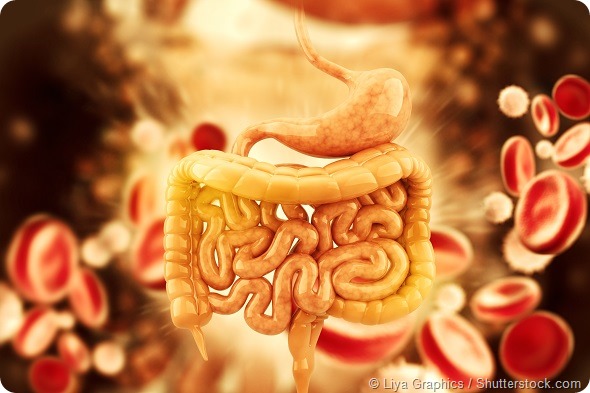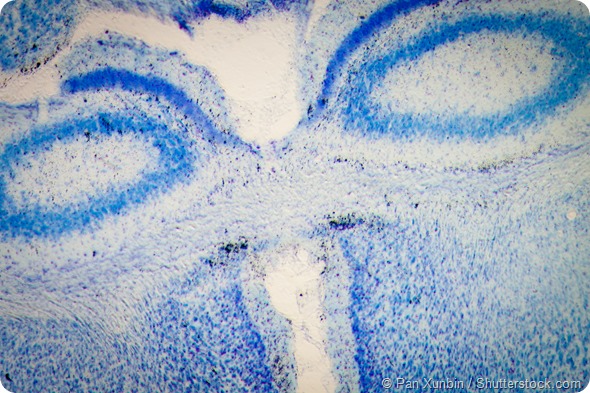Galacto-oligosaccharides are essentially sugar or saccharide molecules that have been joined together into short polymer chains.
GOS is mainly made up of the sugar molecule galactose, with the length of the chain and the way the individual sugars are linked together influencing its physiological properties.
GOS is classed as a prebiotic, since it selectively feeds and promotes the growth of good bacteria in the mammalian gut. Some of the structures found in GOS mimic structures found in maternal mammalian milk, known as Human Milk Oligosaccharides.
GOS remains intact as it passes through the early part of the alimentary canal until it reaches the lower gut. Once there beneficial bacteria, particularly a bacteria called bifidobacteria that naturally resides in our intestine, can break it down and use the products to grow themselves, and the products they formed may benefit us as well.

How much research has there been into GOS to date, in particular with regards to brain development?
To my knowledge, we're the first to show the effect of GOS on the developing brain. I should emphasize that we used a specific formulation of GOS that is in the commercially available prebiotic called Bimuno.
There are a number of forms of GOS available and these differ by the way the galactos molecules are joined up so not all GOS preparations are the same. They may have different properties.
We show changes after Bimuno GOS ingestion, so our findings would not necessarily be the same for other formulations of GOS that might be available. As far as we're concerned, we're the only ones that have shown this so far.
We've used this GOS to show that post-inflammatory anxiety in animals can be prevented by ingestion of Bimuno GOS. Other studies have shown that another preparation of GOS actually influences the life of brain cells in a neurodegenerative model in animals.
There's been lots of studies on GOS in the gut, but very few in the brain, and these have been conducted by us and another group in China.
Please can you outline your recent pre-clinical study investigating the role of GOS in modulating brain development at the molecular level in early life?
We wanted to assess whether proliferating beneficial gut bacteria at an early age could influence brain development, and whether these changes would be sustained in adulthood.
Newly born suckling rats were fed either the Bimuno GOS or a placebo, which was a Bimuno formulation that did not contain GOS. All the animals were fed once a day with the Bimuno GOS or placebo, from post-natal day 3 to post-natal day 21, and were permitted to continue breast feeding.
The rats were then weaned on day 21 and were allowed to grow up to adulthood; that is they were taken away from the mothers and housed in separate cages in small groups, which is the way adult rats are usually kept.
We then looked at the levels of specific proteins in the brains of 22, 56 and the 112-day-old rats. Post-natal day 112 in rats is equivalent to early adolescence in humans, and the proteins we chose are known to be essential for the development, maturation and maintenance of synapses that allow communication between brain cells throughout life.
What were the main findings of your research?
We found that at all ages, rats that had been supplemented with Bimuno GOS, compared to controls, had high levels of the proteins called synaptophysin, GluN2A and BDNF in the hippocampus, a brain region important for memory.
To give you some idea of the importance of these proteins, the function of them has been suggested to be reduced in neurodevelopmental disorders such as schizophrenia, so we proved, at the molecular level at least, that increasing the growth of good bacteria can influence brain development.
The changes we saw are maintained at least until early adolescence. We don't yet know what happens after; further research is needed.

Rat brain hippocampal neurons - microscopy micrograph.
What mechanism do you think is underpinning these changes?
The changes we saw in the brain proteins may have been the result of changes in the immune system or immune response. Researching the role of the immune system in neuropsychiatry disorders is very topical at the moment, and some anti-inflammatory drugs have been shown to alleviate some symptoms of depression and schizophrenia. Gut bacteria are also important in the development of the immature immune system.
Another possible mechanism is through the gut hormones. These molecules circulate in the blood, and are key modulators of metabolism; some can actually directly enter the brain and influence neurotransmission, so we're looking into this possibility as well.
Were you surprised that the changes remained into early adulthood?
To be honest, yes. We thought that once the GOS supplementation was stopped, everything would default back to control levels, so we expected an adaptation to the removal of GOS from the diet, given that the gut and the brain are very adaptable to environmental changes.
However, clearly the increased growth of the good bacteria in early life seemed to be irreversible, at least until up to day 112; early adolescence.
What further research is required to better understand the relevance of your observations?
Although we found changes in the levels of synaptophysin, GluN2A and BDNF, but we have no idea what the functional consequences are. We need to examine whether memory function in GOS-fed mice at an early age is improved in adulthood.
Studies in genetically modified mice have shown that the reduction of GluN2A in the hippocampus impairs spatial memory, so our findings suggest that the memory of GOS-fed animals will be better than placebo-fed animals, so I think the obvious next experiments will involve some key behavioural tests.
%20labeled%20with%20green%20fluorescent%20marker.%20Implicated%20in%20mood%20and%20memory-ibreakstock.jpg)
New born neurons in the transgenic mouse hippocampus (dentate gyrus) labeled with green fluorescent marker. Implicated in mood and memory.
What do you think the future holds with regards to understanding the complex interactions between diet and brain development during early life?
There has been steady progress in the understanding of diet/brain interactions, and a rapid expansion in nutritional neuroscience research. This has been mainly driven by public interest and the need to find natural compounds to treat illnesses without side effects.
I think we'll soon be able to identify and understand how individual nutritional compounds in both infant and maternal diets influence brain development, and whether that happens indirectly via the gut bacteria, or by directly entering the brain to influence neurotransmission. I think this field will continue to expand and we will learn a lot more.
Do you think prebiotics will ever replace drugs?
No, I don't think they're powerful enough to replace drugs. I still think that psychotropic drugs have a place in the treatment of psychiatric disorders, but perhaps, nutritional substances might aid in their effect.
Prebiotics may make the brain more responsive to drugs, especially in those people where drugs don't work, or mitigate some unwanted side effects.
For instance, some medication used to treat schizophrenia causes weight gain and diabetes. Since gut bacteria modulate host metabolism, it is not unreasonable to suggest that GOS could be taken alongside antipsychotic drugs, to remove these unpleasant side effects and improve the quality of life of schizophrenia patients - this is potentially an extremely important application for prebiotics. Therefore, I think these dietary compounds may have a place as adjuncts in treatment.
About Dr Phil Burnet
Dr Burnet was awarded a PhD in Biomedical Sciences from Imperial College, London, in 1989. From then until 1992, he was a post-doctoral Fogarty Visiting Fellow at the National Institute of Mental Health, USA, where he developed his interest in the neurobiology and treatment of psychiatric disorders.
In 1992, Dr Burnet received an MRC Training Fellowship at the University Department of Psychiatry, Oxford, and a University Research Lectureship in 2000. His work continues to focus on the molecular, nutritional and pharmacological modulation of glutamate receptors and brain health.